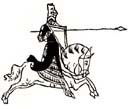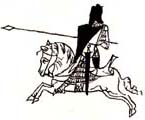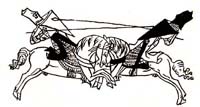 |
Polemics

 |
 |
A Letter to Bishop Bruskewitz |
  |
Jonathan Tuttle
July 31, 2000
"Most Holy Father … because He [Christ] has given you authority and because you have accepted it, you ought to use your virtue and power. If you do not wish to use it, it might be better for you to resign what you have accepted; it would give more honor to God and health to your soul. … If you do not do this, you will be censured by God. If I were you, I would fear that Divine Judgment might descend on me" (from a letter to Pope Gregory XI by a "holier-than-thou" traditionalist on a "trajectory toward schism," otherwise known as St. Catherine of Siena, Doctor of the Church).
"…Show yourself a man and begin to renew My Church which I have bought with My blood, so that it may be born again and return to its former state … But this you shall know of a surety, that if you do not obey My will, judgment will be passed upon you as upon a prelate who is degraded and deprived of his ecclesiastical vestments. Everything that has formerly been peace and honor to you shall then be damnation and shame. …And every devil in hell shall have a piece of your soul and fill it with everlasting damnation"
letter to Pope Gregory XI by an Integrist "prophet of doom," otherwise known as St. Bridget of Sweden, writing in the name of the Blessed Virgin Mary.
Cardinal Richelieu commented several hundred years ago that treason is only a matter of dates. That truth of history has been ignored recently by some of our "conservative" Catholic friends, who seem unaware that from the perspective of Church history what would seem "treasonous" criticism of the Pope was in fact necessary and even a Christian duty.
The recent attack on The Remnant by The Wanderer and Stephen Hand is a prime example of this historical blindness. St. Paul, St. Thomas Aquinas, St. Catherine of Siena, St. Alphonsus Liguori, St. Robert Bellarmine, St. Athanasius, St. Bridget, not to mention countless others, have all taught that Prelates, including the Pope, may be questioned and even rebuked by their subjects for actions which cause scandal or harm to the common good of the Church. Stephen Hand and Al Matt apparently feel that criticism of the Pope, even on prudential matters, is not only no longer acceptable, but is "schismatic" behavior per se. Although Hand and Al Matt would no doubt count themselves among the admirers of the saints just mentioned, their recent comments would indicate that they know nothing of the teaching and example of these saints on the God-given right of subjects to object to the harmful conduct of their superiors.
I don’t remember Michael Matt or Atila Guimarães ever making the assertion that every devil in hell would have a piece of any Pope. Those are fighting words. The content of We Resist You to the Face was mild by any historical comparative standard. But, alas, our accusers would reply, the authors of We Resist You to the Face are not saints and doctors of the Church, like Catherine of Siena. Yes, but they are following St. Catherine’s example. But that was a special case, our accusers would say. To this, I would reply with an open invitation to Stephen Hand and Al Matt: Please provide us wayward traditionalists with a canon of those saints whose example we should follow and those whose example we should disdain. You would be in the envious position of correcting canonized saints - which, by the way, your writings are already attempting to do.
Although Stephen Hand’s instantly infamous article "Traditionalists, Tradition, and Private Judgment" has already been addressed in part by Christ Ferrara and Dr. Thomas E. Woods, a competent Catholic psychiatrist should probably also do a thorough analysis, because Hand’s piece was evidently written by an admittedly troubled soul. Therein lies the question that conservatives must ask themselves at some point in this debate: why would Catholics in good standing, such as Al Matt and Bishop Fabian Bruskewitz, hitch their respective wagons to a man who is admittedly experiencing the greatest spiritual turmoil of his life?
A paralegal by trade (Hand) publishes a pamphlet which purports to unmask The Remnant and its readers, and then rides into town charging three dollars and fifty cents so we can all read his indictment of thousands of Catholics on "anecdotal" evidence. Here is a self-proclaimed liturgical expert, who just a few months ago questioned whether it fulfilled your Sunday obligation to attend the Novus Ordo Mass. With six years of criticism of the machinations of Rome under his belt, after one trip to the Eternal City, Stephen Hand and his critiques folded like a cheap umbrella. Now, several months after Hand’s self-proclaimed epiphany, Bishop Bruskewitz endorses Hand with accolades heretofore reserved strictly for such conservative "luminaries" as Scott and Kimberly Hahn and Mary Beth Bonacci.
Although speculation as to what happened to Stephen Hand in Rome would be as fruitless as the ambiguous and confusing Council he begs us to "obey," one thing is clear: Bishop Bruskewitz may end up regretting his endorsement.
Preface to the masterwork
I have never been one to criticize rhetorical style and grammatical nuance, but Bishop Bruskewitz’s preface to Hand’s piece is some of the most confusing language you’re liked to see outside an Ebonics symposium. What the preface lacks in loquacity, it makes up for in sheer disarray. Even though it is only six paragraphs in length, it is so full of mixed metaphors, dangling modifiers, and poor analogies that at times I didn’t know whether the Bishop was praising traditionalists or condemning us. I have read the preface at least ten times, and I am still uncertain as to exactly where His Excellency stands. Perhaps something in the way of "traditional Catholics: bad; Stephen Hand: good" might not only have clarified his position, but would have been more powerfully written.
For instance, Bishop Bruskewitz writes of removing cinders from an eye and then cutting off your head if you have a headache, and then removing a cinder again, and then removing an eye and filling the eye-socket with cinders. He goes through all these gruesome antics without ever making a single distinct point. Further on, although I’m not sure, it seems as if Bishop Bruskewitz compares the New Mass to a headache.
However, as poor as the style is, the content is even more puzzling.
Who's holy now?
As confusing as the preface is, it may be possible to discern an argument. The Bishop apparently claims that traditionalists have left the Catholic Church, believing themselves "holier-than-thou." Yet he also says the following:
"It takes a faith-filled and prayer-filled discerning Catholic life to distinguish liturgical abuses, doctrinal and moral aberrations, and grave disciplinary infractions occurring in the lives and practices of people within the Church, from the Church itself, which despite being composed of sinful members, remains the Spotless Spouse and Bride of Christ, not a Church of
Cathers or Albigensians, but a Church of those who carry within themselves the sad effects of original sin while at the same time bearing the grace of God, which is to say, the seeds of eternal happiness."
Although the precise point of this ninety-two word sentence is far from clear, the Bishop seems to be saying that traditionalists do not have "faith-filled and prayer-filled" Catholic lives, like Stephen Hand does. In other words, Stephen Hand is holier than Michael Matt, Marian Horvat, Atila Guimarães, John Vennari and innumerable other "integrists." For purposes of brevity, I will refer to the swelling ranks of the accused as "the usual suspects."
In Stephen Hand more "faith-filled and prayer-filled" than the usual suspects? Or more simply: Is he holier than they? Stephen Hand surely thinks so. On his Website, Hand takes off the gloves, no pun intended, in describing The Remnant and its journalists:
"There is no journalism among them, only schismatic propaganda. TCR, after all this, has therefore placed The Remnant and Tradition In Action on its non-Catholic schismatic list. They are clearly not Catholic anymore."
Hand has apparently come to regard his personal Website as a par-juridical arm of the Vatican, authoritatively guiding the unsuspecting Catholic through the minefield of integrism and schism by identifying those who have left the Church and whose views should no longer be considered. And who gave him this authority? Why, it seems he gave it to himself. No "private judgment" there!
Want to know whether you are Catholic or not? Talk to Hand.
Hand’s list reminds one of Victor McLaglen’s role in The Quiet Man, the gruff and grumpy brother of Maureen O’Hara’s character, who threatened to add anyone and everyone who crossed him to his little black book.
Hand’s service, in his words, is to "delineate the major objections I have expressed on many occasions since that time to the extreme traditionalist, i.e., integrist, positions, and then suggest a more Catholic approach to working for legitimate changes in perfect communion with the Holy Father."
Oh, Stephen, do show us the way!
So, while Bishop Bruskewitz complains that traditionalists think they are "holier-than-thou," Hand and Al Matt make is quite clear that they are all holier than traditionalists. Hand even provides a list - a list! - of those who are no longer included in the Mystical Body of Christ, and declares that he will outline the "more Catholic" approach to the crisis in the Church.
Clearly, Hand's tract needs a new title: Conservatives, Tradition and Private Judgment."
A question of pride
Bishop Bruskewitz regards this whole problem as being rooted in pride. Attempting to make his point, he paraphrases the Angelic Doctor:
"St. Thomas Aquinas calls pride the queen and mother of all vices, and oftentimes those who perhaps rightly perceive grave faults and defects in
people in the Church, even sometimes in people with positions of clerical authority, forget their own creatureliness and sinfulness, and the ability they themselves have to fall into serious error."
True, pride is the mother of all vices, yet how this pertains to the discussion is unclear. The argument that members of the laity must not question their Prelates because they themselves are sinners is neither logical nor Catholic. When I reprimand my three-year-old for throwing a temper tantrum, I don’t begin the disciplinary process with an explanation to him of my "creatureliness." My creatureliness is hardly germane to the matter. The fact of our personal sins does not extinguish our right to protest what is wrong in the conduct of others which harms us or the Church.
More importantly, my "creatureliness" does not free me from the obligation to correct those in error, even Prelates. St. Thomas reminds us of this, teaching that laymen have a duty to correct Prelates when they are in error: "The fraternal correction which is an act of charity is within the competency of everyone in respect of any person to whom one is bound by charity, provided there is something in that person which requires correction." (Summa, Pt. II-II, Q. 33, Art. 4) St. Thomas goes on to cite the Scriptural example of St. Paul publicly rebuking the first Pope: "It must be observed, however, that if the Faith were endangered, a subject ought to rebuke his Prelate, even publicly. Hence Paul, who was Peter’s subject, rebuked him in public on account of the imminent danger of scandal concerning the Faith." Was there an imminent danger of scandal when the Pope declared that he would celebrate Vespers with pro-abortion Lutheran "bishops"? Was there scandal when he kissed the Koran, the "holy book" of the Muslims, who are at this moment slaughtering Catholics by the thousands? Surely, even our accusers can admit that there was.
As St. Thomas reminds us, there was a time when correcting Prelates who cause scandal was regarded as a spiritual work of mercy, not a schismatic act. But perhaps His Excellency did not have room for the teaching of St. Thomas in his discussion of cinders, headaches and eye-sockets.
The primrose trajectory
While Al Matt simply claims that traditionalists are on a "trajectory toward schism," Bishop Bruskewitz apparently believes that traditionalists are no longer merely on a trajectory, but in full-blown schism, comparing traditionalists to Jansenists.In comparing traditionalists to Jansenists, the Bishop is either making a very poor analogy or is intentionally saying that traditionalists are not only schismatic, but heretical. Although his preface is short, schism is a theme that Bishop Bruskewitz repeats:
"In his masterful work, An Essay on the Development of Christian Doctrine, John Henry Newman points out how in the course of the Church’s history she occasionally appears to fall into a deliquium, from which, under God’s grace, she emerges victorious and stronger than ever. Many of those who defy the Church and even leave the Church in the name of "tradition," thus contradicting the very word by which they choose to define themselves, are ignorant in their despair regarding the Church’s future or the realities of the Church’s history through 2,000 years."
Bishop Bruskewitz’s entire preface is an attack on a straw man. He accuses the usual suspects of schism at least five times in his piece, yet provides not a shred of evidence that anyone associated with The Remnant has ever been guilt of schism. When we question the Holy Father for having interfaith meetings, such as the pantheon of Assisi, we provide a stack of evidence a mile high that his act is incompatible with tradition. (Incidentally, I have never suggested publicly or even privately that the Holy Father ever sinned in this act or any other. I cannot read his heart. I seek merely to judge objective actions, which is perfectly permissible - and, by the way, charitable.) We quote Councils, encyclicals, the Scripture, the Commandments and writings of the Saints and apply them to specific actions of the Holy Father, which are without precedent in the History of the Papacy, as the Pope himself has declared. But our accusers dismiss the evidence out of hand. In fact, they will not even discuss it. I haven’t witnessed a flagrant
disregard of evidence this bad since the O.J. Simpson trial.
By the way, it is interesting that the Bishop quotes Cardinal Newman in this debate, since Newman was a foremost opponent of the First Vatican Council’s decision to
define Papal infallibility, deeming that it was imprudent to do so at that time. Yet somehow Cardinal Newman managed to stay in the Church. I wonder why Cardinal Newman’s comments didn’t launch him on a trajectory toward schism?
Or, perhaps in the eyes of Al Matt, it did.
Bishop Bruskewitz also accuses the usual suspects of ignorance of Church history and of despair. Thus, he casually accuses those associated with The Remnant of schism, despair and culpable ignorance of the Church’s history. We are living in an age in which conservatives casually accuse traditionalists of many things: most recently, schism and despair. When you accuse a Catholic of the sin of schism, that is no less weighty than accusing him of rape. When you accuse a Catholic of despair, you are accusing him of a sin by which infanticide pales in comparison.
However, if I accused Stephen Hand of being an infanticidal rapist on the same evidence by which I am indicted, not only would there be an outcry among all those involved, it would be an offense to God as a supreme act of injustice against the Eighth Commandment. What the conservatives seem unable to fathom is that when they accuse us of schism (and despair), they accuse us not of making an unimportant legal blunder, they accuse us of meriting eternal damnation for crimes committed against the Mystical Body of Christ.
It is amazing to me that Al Matt, Stephen Hand and Bishop Bruskewitz casually accuse groups of people that they have never spoken with in their lives of spiritual infanticidal rape en masse, without ever stopping to consider the gravity of the crimes of which they accuse us, or the consequences of the accusations.
A letter to His Excellency
Your Excellency,
I admire your pro-life stance at a time when it is not politically correct among your peers. You have also taken a brave stance against groups that oppose the Magisterium,as that term is properly understood. They usual suspects accept the Magisterium, the teaching office of John Paul II, just as we accept the Magisterium of the Pontiffs who preceded him, who cannot possibly contradict each other. However, we do not believe that the Magisterium includes kissing the Koran, apologizing to the world for the Crusades, "the marginalization of women" and other "sins" against liberalism, conducting interfaith prayer meetings with animists and snake-worshipers, or celebrating Vespers with heretics who condone murder in the womb. We do not believe that the Holy Father exists in a state of perpetual blamelessness like the twice-born Christian, and frankly, we don’t believe that you do him any favors by refusing to admit that he has caused scandal and confusion with his many innovations.
Friends don't let friends kiss the Koran.
Also, why do you believe that Stephen Hand (whose main qualification is that he has written extensively for a publication he now denounces as "schismatic") possesses the singular ability to "labor zealously within the boundaries of the Church herself for her growth in holiness, and willingly, even joyfully, do all possible to eliminate doctrinal, moral, liturgical, and disciplinary aberrations." How is it that Hand possesses the competence to identify and eliminate aberrations in the Church without falling into schism, whereas we do not? Are you bestowing a unique ecclesial privilege on Mr. Hand?
Your endorsement of Hand also raises an important issue of ecclesial communion. Hand admits to being one of the "extreme traditionalists" for a number of years, until his recent change of heart. When he was a member of this "schismatic" group, had he ceased to be Catholic? He can hardly claim that "extreme traditionalists" are outside the Church, whereas he remained within the Church when he was one of them. Therefore, has Hand been formally re-admitted to the Church since his abandonment of the alleged "schism"? Of course not. And that is because he never left the Church in the first place. And neither have we.
Although this discussion will no doubt rage for the next several months, I will attempt to refrain from reentering the fray. In the final analysis, this is not my problem; it is your problem, your Excellency. You have the unhappy job of looking into the bloodshot eyes of a mother who spent the night crying because her last Catholic child decided to leave the church, marry his Jewish girlfriend and see how much Judaism has, in the Council’s words, a "share in the truth." You have the job of telling your parishioners who have just returned from Hawaii that the hula mass they attended while on vacation was not a liturgical abuse at all, but was actually approved by the Vatican. You have the job of defending the papal kissing of the Koran, that "holy book" (to use the Holy Father’s own words) which compares the Eucharist to excrement. Admittedly, you are in a more difficult position that I am. As a layman, I refuse to defend the indefensible; as a Prelate, your defense of the indefensible is almost a full-time job. Your Excellency, I close by simply pointing out that Stephen Hand is your problem now. You have lent your name to his writings, now and forever. He has gone from conservative to traditionalist and back to conservative. Whenever he goes next, your name goes with him. Six months is a long time.
Next Article

Other Articles in the Polemic
 Some Presuppositions Some Presuppositions
Presuppositions and context of the controversy
 The Bishop's Preface The Bishop's Preface
Bishop Fabian W. Bruskewitz
 Five Questions for Msgr. Bruskewitz Five Questions for Msgr. Bruskewitz
Atila Sinke Guimarães
 His Excellency's Insinuations His Excellency's Insinuations
Marian Therese Horvat, Ph.D.
 An Apology to Atila Guimarães and
Marian Horvat An Apology to Atila Guimarães and
Marian Horvat
Stephen Hand


|
Polemics | Home | News | Books | CDs | Search | Contact Us

© 2002-
Tradition in Action, Inc. All Rights Reserved
|
 |
|
